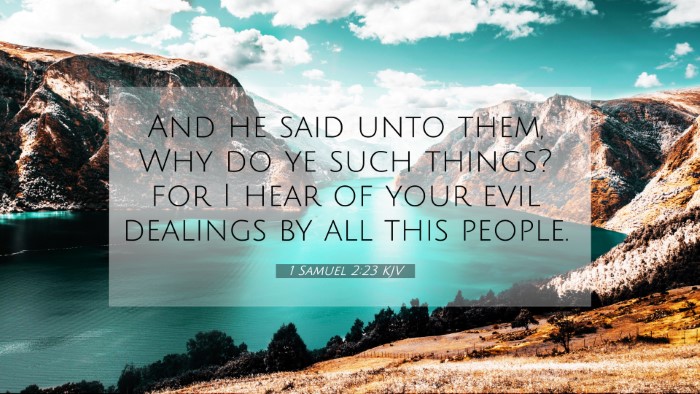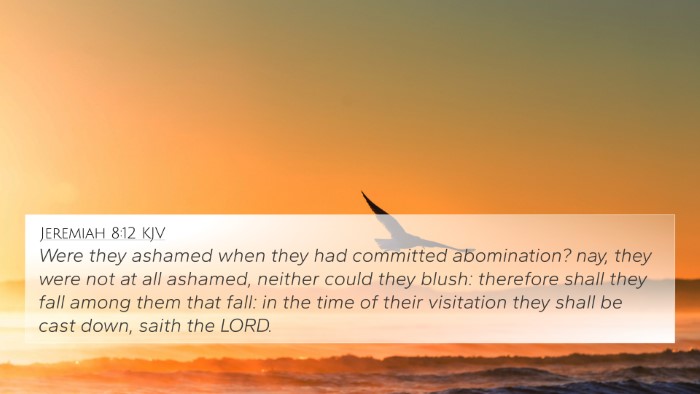Understanding 1 Samuel 2:23
Verse: "And he said unto them, Why do ye such things? for I hear of your evil dealings by all this people." (1 Samuel 2:23)
Overview
This verse captures the moment when Eli confronts his sons, Hophni and Phinehas, regarding their corrupt practices as priests. This passage is significant in illustrating the moral decline within the priesthood and the impact of neglecting God’s commandments.
Key Themes
- Corruption in Leadership: The actions of Eli's sons emphasize the dangers of moral failure among those in positions of authority.
- Accountability: Eli’s questioning of his sons reflects the responsibility of leaders to uphold justice and righteousness.
- Public Awareness: The mention of "all this people" suggests that the sins of the priests were public knowledge, illustrating the broader implications of their behavior.
Commentary Insights
Matthew Henry: Henry emphasizes the seriousness of Eli’s indictment against his sons, noting that their corrupt practices were not just personal failings but had far-reaching effects on the community's faith and worship. He brings attention to the irresponsibility of leaders who fail to align their actions with God’s standards.
Albert Barnes: Barnes highlights that Eli's inquiry is rooted in a deeper concern for God’s people and the integrity of the worship system. He notes that Eli’s approach reflects a lack of decisive action, underlining the need for leaders to take a firm stand against wrongdoing.
Adam Clarke: Clarke points out that Eli’s question reveals an awareness of the gravity of his sons' sins. He emphasizes the importance of parental guidance and the dire consequences that result from neglecting such responsibilities.
Cross-References
This verse is interconnected with several other biblical passages that address themes of leadership, accountability, and moral conduct:
- Exodus 32:21: The confrontation between Moses and Aaron regarding the sin of the golden calf.
- Proverbs 29:12: "If a ruler hearken to lies, all his servants are wicked,” highlighting the consequences of corrupt leadership.
- 1 Timothy 5:20: Encouraging church leaders to rebuke those who sin publicly.
- Matthew 23:25-26: Jesus rebukes religious leaders for their hypocrisy.
- Hebrews 13:17: The call for church members to obey and submit to their leaders, as they watch over souls.
- Jeremiah 23:1-2: A warning against shepherds who destroy and scatter the sheep of God’s pasture.
- 1 Peter 5:2-3: An exhortation for elders to shepherd willingly and eagerly, not for dishonest gain.
Connections Between Bible Verses
1 Samuel 2:23 serves as a crucial link in understanding the broader narrative of biblical accountability and the emphasis on moral integrity. The consequences faced by Eli’s family draw parallels with other scriptures that address the failures of leaders throughout biblical history:
- Leviticus 10:1-2: The story of Aaron's sons, Nadab and Abihu, teaches about the seriousness of holy conduct in worship.
- 2 Samuel 12:1-7: Nathan’s confrontation with King David reveals God’s demand for a reckoning in the face of sin.
Thematic Bible Verse Connections
Across scripture, the theme of moral failure among leaders is prevalent and serves as a cautionary tale:
- Isaiah 56:10-11: Describes watchmen who are negligent and blind, failing in their duties to protect God’s people.
- Ezekiel 34:10: God’s judgment on the shepherds of Israel who do not care for the flock.
Conclusion
The warnings found in 1 Samuel 2:23 resonate through many layers of scripture. Eli’s failure to decisively correct his sons serves as an enduring lesson on leadership responsibility and the impact of moral failure, demonstrating how the sins of a few can tarnish the faith of many.
Study Tools for Cross-Referencing
For those seeking tools and resources to delve deeper into the connections among Bible verses, consider utilizing:
- Bible Concordance: A tool to help locate specific verses and their thematic connections.
- Bible Cross-Reference Guide: Guides that highlight interrelated scriptures, aiding in comprehensive studies.
- Cross-Referencing Bible Study Methods: Techniques to systematically explore contextual links between scriptures.
Applying the Insights
As you reflect on 1 Samuel 2:23, consider the following:
- What does this verse reveal about the responsibilities of leaders in both religious and secular contexts?
- How can you apply the principles of accountability and integrity in your own life?
- Are there parallels in your experiences that echo the themes presented in this passage?









